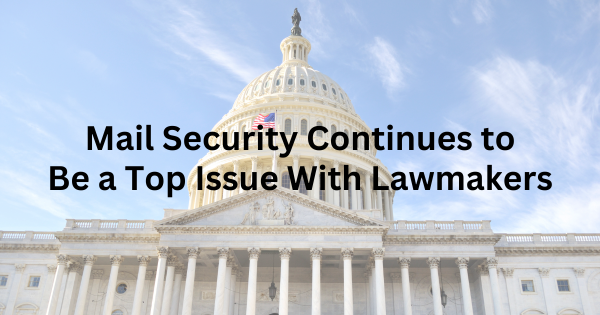Mail Security Continues to Be a Top Issue With Lawmakers
Mail Security Continues to Be a Top Issue With Lawmakers
By Bob Levi
NAPS Director of Legislative & Political Affairs
Early last month, I came across a short article on the Forbes Magazine website that, in part, seemed to embrace the prospect that commercial mail receiving agencies (e.g., the UPS Store, FedEx, Kinkos, etc.) will play a more prominent role in the future of mail service. This alarming, private-sector expectation should send a shock wave down the postal spine.
It would appear for-profit postal players see lucrative opportunities resulting from reduced mail safety and security, decreased on-time First-Class performance and declining physical retail postal accessibility. While these factors always have been on the periphery, they now are becoming more prominent.
The commercial mail entities see an opportunity to provide a more secure and convenient venue for receiving and sending mail. For this reason, this month’s NAPS Legislative Training Seminar (LTS) provides an important forum to promote the essential value of a universal and secure U.S. Postal Service.
Recently, Executive Vice President Chuck Mulidore and I visited congressional offices to cultivate the legislative landscape for NAPS members who will engage with their elected representative this month. Clearly, mail security is a top issue with many members of Congress.
The marked escalation in mail theft and robberies against postal employees on the job has captured the attention of elected officials on and off Capitol Hill. In fact, on Jan. 30, the Maryland House of Delegates was so frustrated by the increases that its Judiciary Committee conducted a hearing on legislation to make mail theft a felony at the state level.
Regrettably, the Postal Service has appeared to abandon its most effective means of mail security, employee protection and postal-crime deterrence—the appropriate deployment of postal police officers. Relegating postal crime prevention and law enforcement to states and localities is misguided.
For example, most federal mail theft laws are more severe than existing state laws. Federal laws cover theft from any authorized mail depository, while state laws only apply to a mailbox. Also, federal law can aggregate the value of stolen mail or separate mail crimes; federal charges are heard in federal court.
Moreover, the penalty for being convicted in federal court carries up to five years in prison and $250,000 in fines. Most states limit jail terms to less than one year and a $10,000 fine. Furthermore, federal law contains specific provisions making it a federal crime to assault a government employee in the performance of their official duty or interference with the employee’s duty. Postal employees are included among the covered employees.
The penalty for an armed assault can get a criminal up to 20 years in prison and a fine of up to $250,000. Inasmuch as NAPS believes and data demonstrates, the risk of apprehension is the best deterrent to postal-related crime, combined with the application of stiff federal penalties.
Restoring the postal police force’s authority to enforce the law on and off postal property is a major component of securing the mail, protecting postal property and safeguarding postal employees. These are the reasons NAPS will be promoting H.R. 3005 and S. 3356, the Postal Police Reform Act, at LTS.
Related to mail security is the attention that will be placed on the security of absentee election ballots. As you know, we are in midst of an election year in which the entire House, one-third of the Senate and the president and vice president will be on the November ballot.
One of the tools for ensuring the security of ballots is legislation approved by the House Committee on Oversight and Accountability on Feb. 6—H.R. 5658. The Vote by Mail Tracking Act would improve efficiency and transparency by requiring tracking barcodes and an official election logo on mail-in ballot envelopes.
This identifying information would help the Postal Service process election material and provide voters the ability to see their ballots are securely delivered and counted. Reps. Katie Porter (D-CA) and Nancy Mace (R-SC) introduced the bipartisan bill in September 2023. NAPS looks forward to the House and Senate promptly passing the measure.
Postal mail performance also has attained enhanced interest, particularly among rural members of Congress. The ongoing realignment of mail logistics facilities appears to have a disproportionately disruptive impact on thousands of rural post offices. The existing postal statute [39 USC 101(b)] declares: “The Postal Service shall provide the maximum degree of effective and regular postal services to rural areas, communities, and small towns where post offices are not self-sustaining.”
Unfortunately, the realignment plan, employing the optimized collections mantra, likely will eliminate evening mail pickups at thousands of post offices for transport to a processing center. Consequently, mail delivered to those post offices or collection boxes feeding those post offices will have to wait until the next morning’s mail pickup, delaying the mail by at least one day. This was just another hidden attribute in the 10-year plan that Congress and the Postal Regulatory Commission will want to examine more closely.
In our postal world, March has come in as lion—and will stay that way.
